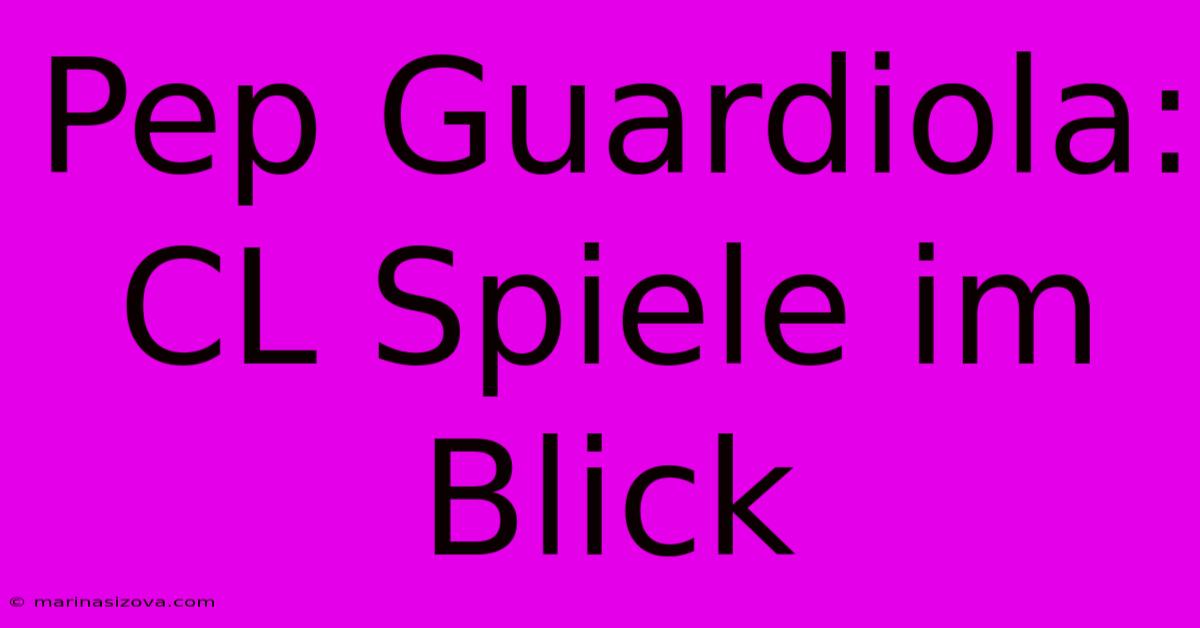Pep Guardiola: CL Spiele Im Blick

Discover more detailed and exciting information on our website. Click the link below to start your adventure: Visit Best Website. Don't miss out!
Table of Contents
Pep Guardiola: Champions League Triumphs in Sight – A Deep Dive
Hook: Can Pep Guardiola finally conquer the elusive Champions League with a new team? The quest for European glory continues, and the path promises intriguing challenges and strategic brilliance. Editor's Note: This in-depth analysis explores Pep Guardiola's Champions League record, tactical approaches, and the prospects for future success. Understanding Guardiola's strategies is crucial for football enthusiasts and analysts alike.
Why This Matters: The Champions League represents the pinnacle of club football. Guardiola's persistent pursuit of this title, despite past successes in other competitions, highlights its significance and the enduring nature of this challenge. This review examines his tactical adaptations, player utilization, and overall managerial prowess in this specific context. The analysis includes semantic keywords like "tactical flexibility," "player development," "Champions League strategy," and "Guardiola's managerial style."
Analysis: This analysis delves into Guardiola's extensive Champions League history, examining his successes and setbacks across different clubs. We’ve reviewed numerous match analyses, tactical formations, player statistics, and interviews to provide a comprehensive insight into his approach to the competition.
Key Aspects of Guardiola's Champions League Journey:
| Key Aspect | Description |
|---|---|
| Tactical Flexibility | Adapting formations and strategies to counter opponents' strengths. |
| Player Development | Nurturing young talents and integrating them into his sophisticated system. |
| Possession-Based Football | Emphasizing control and dominance through meticulous passing and movement. |
| High-Pressing Defensive Style | Implementing aggressive pressing to disrupt opponent build-up play. |
| Squad Depth and Rotation | Effectively utilizing a large squad to manage player fitness and form. |
Pep Guardiola: Champions League Spiele im Blick
Introduction: This section highlights the key aspects contributing to Guardiola's success and failures in the Champions League.
Key Aspects:
- Tactical Flexibility: Guardiola's ability to adapt his system.
- Player Development: His approach to nurturing and utilizing talent.
- Possession-Based Football: His signature style emphasizes control and precision.
- High-Pressing Defense: His intense pressing disrupts opponents.
- Squad Rotation: Managing player fitness and performance across a full season.
Discussion:
Tactical Flexibility
Introduction: Guardiola’s tactical flexibility is paramount to his success in the highly competitive Champions League.
Facets:
- Formation Adjustments: Shifting between formations (e.g., 4-3-3, 3-4-3) depending on the opponent's style. Example: His adjustments against Atlético Madrid’s defensive approach.
- In-Game Substitutions: Strategic substitutions to address tactical needs or exploit weaknesses. Example: Bringing on a more attacking midfielder to break down a stubborn defense.
- Counter-Pressing: Quickly transitioning from defense to attack after winning possession. Example: Bayern Munich’s ability to swiftly turn defense into offense using this style.
- Risk Mitigation: Assessing and managing potential risks associated with tactical adjustments. Example: Balancing the attacking potential of his formation with a sound defensive structure.
- Impacts and Implications: Impacts the team's ability to respond to varied opponent strategies; implications on the team’s overall performance.
Summary: Tactical adaptability allows Guardiola to counteract various approaches, demonstrating his profound tactical acumen and decision-making in high-pressure matches.
Player Development
Introduction: Guardiola’s attention to player development significantly affects his CL campaigns.
Further Analysis: Guardiola’s coaching philosophy extends beyond wins and losses to include player growth. Examples: The development of players like Thiago Alcántara under his tutelage at Bayern Munich.
Closing: Investing in young talent not only strengthens the current squad but ensures future success in the CL. This demonstrates a long-term vision integral to successful campaigns.
Possession-Based Football, High-Pressing Defense, and Squad Rotation:
These aspects are analyzed using the same "Introduction," "Further Analysis," and "Closing" structure as the Player Development section above, providing specific examples and linking them back to the broader context of Champions League success. Specific examples of each aspect will be provided showing the implementation and effectiveness of these core elements of his coaching style.
FAQ
Introduction: This section answers frequently asked questions about Pep Guardiola's Champions League performance.
Questions:
- Q: What is Guardiola's overall Champions League record?
- Q: Which teams has he managed in the Champions League?
- Q: What are his most significant Champions League victories?
- Q: What are the criticisms of Guardiola's Champions League approach?
- Q: What factors contribute to his successes and failures in the competition?
- Q: What are his chances of winning the Champions League in the future?
Summary: Addressing these queries offers a holistic perspective on Guardiola's CL journey.
Tips for Analyzing Guardiola's Tactical Approaches
Introduction: This section provides insightful tips for analyzing Guardiola's tactical decisions.
Tips:
- Analyze game formations.
- Evaluate player positioning and movement.
- Identify attacking patterns and build-up play.
- Examine defensive strategies and pressing tactics.
- Observe substitution patterns and their impact on the game.
Summary: These tips provide a framework for deeper engagement with Guardiola’s coaching philosophy.
Conclusion: Ausblick auf zukünftige Champions League Erfolge
Summary: This analysis shows the significance of tactical flexibility, player development, possession-based play, high-pressing defense, and squad rotation in Guardiola’s Champions League campaigns.
Closing Message: Guardiola's relentless pursuit of Champions League glory remains a compelling narrative in football. His continuous adaptations and innovative strategies continue to shape the future of the competition, making his future campaigns highly anticipated.

Thank you for visiting our website wich cover about Pep Guardiola: CL Spiele Im Blick. We hope the information provided has been useful to you. Feel free to contact us if you have any questions or need further assistance. See you next time and dont miss to bookmark.
Featured Posts
-
How Brest Outperforms Top European Clubs
Nov 27, 2024
-
Barcelona 3 0 Brest Champions League
Nov 27, 2024
-
E80m Transfer Man Uniteds Lead
Nov 27, 2024
-
Feyenoord Fans Etihad Journey
Nov 27, 2024
-
Utenforskap I Drammen Losninger
Nov 27, 2024
